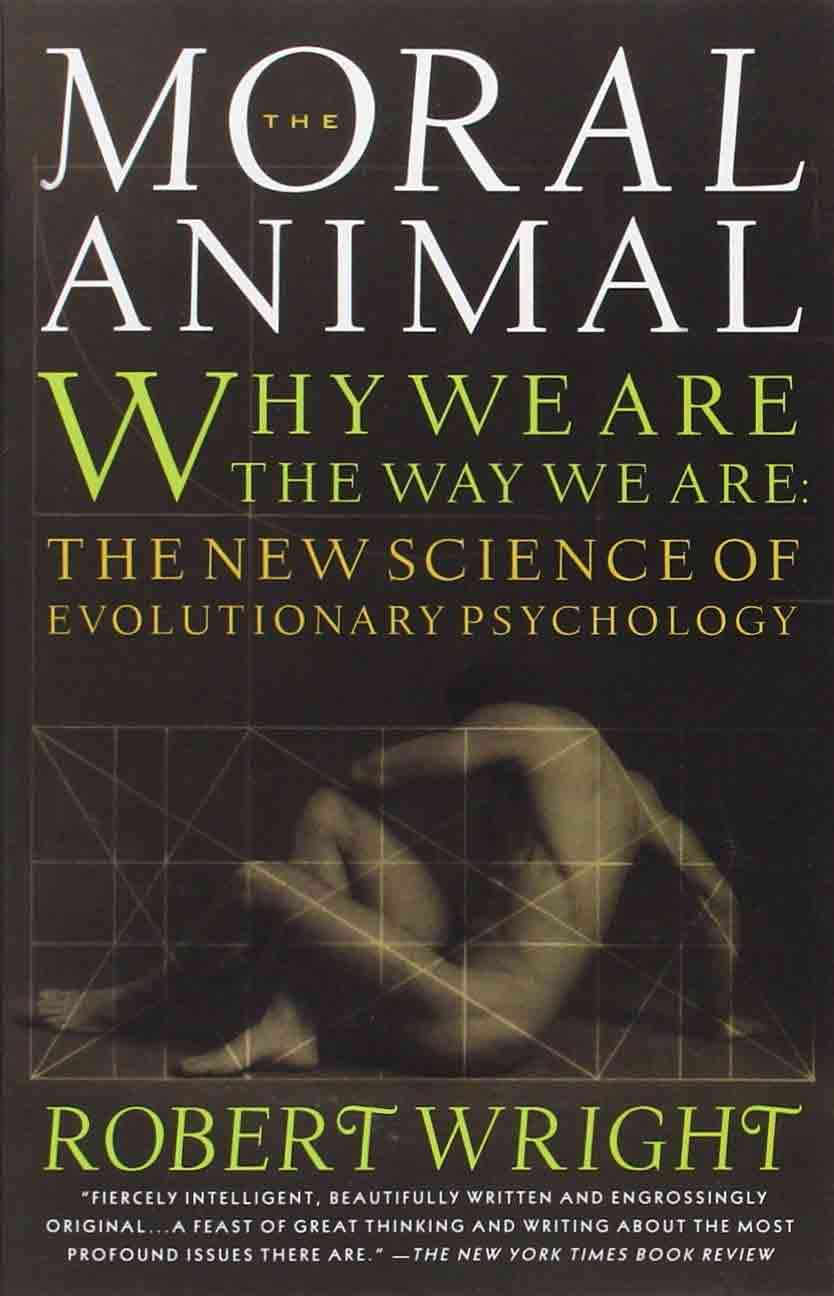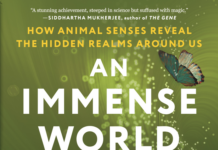But it has taken only around 5,000 generations to turn a wolf into a chihuahua — and, at the same time, along a separate line, into a Saint Bernard.
==========
This ongoing adjustment to circumstance can give organic life a certain jerry-built quality. (It’s the reason people have back trouble; if you were designing a walking organism from scratch rather than incrementally adapting a former tree-dweller, you would never have built such bad backs.)
==========
(That, in fact, is biology’s official definition of a female: the one with the larger sex cells.)
==========
This isn’t to say that there’s anything wrong with „unproductive“ sexual recreation. Just because natural selection created us doesn’t mean we have to slavishly follow its peculiar agenda.
==========
We aren’t designed to stand on crowded subway platforms, or to live in suburbs next door to people we never talk to, or to get hired or fired, or to watch the evening news.
==========
This disjunction between the contexts of our design and of our lives is probably responsible for much psychopathology, as well as much suffering of a less dramatic sort.
==========
„essential role may end with copulation, which involves a negligible expenditure of energy and materials on his part, and only a momentary lapse of attention from matters of direct concern to his safety and well-being.“
==========
Hence courtship: „the advertisement, by a male, of how fit he is.“ And just as „it is to his advantage to pretend to be highly fit whether he is or not,“ it is to the female’s advantage to spot false advertising. So natural selection creates „a skilled salesmanship among the males and an equally well-developed sales resistance and discrimination among the females.“ In other words: males should, in theory, tend to be show-offs.
==========
The natives, it seemed, hadn’t even gotten the connection between sex and reproduction. When one seafaring Trobriander returned from a voyage of several years to find his wife with two children, Malinowski was tactful enough not to suggest that she had been unfaithful. And „when I discussed the matter with others, suggesting that one at least of these children could not be his, my interlocutors did not understand what I meant.“19
==========
Can anyone find a single culture in which women with unrestrained sexual appetites aren’t viewed as more aberrant than comparably libidinous men? If not, isn’t it an astonishing coincidence that all peoples have independently arrived at roughly the same cultural destination, with no genetic encouragement? Or is it the case that this universal cultural element was present half a million or more years ago, before the species began splitting up? That seems a long time for an essentially arbitrary value to endure, without being extinguished in a single culture.
==========
Indeed, males are so dim in their sexual discernment that they may pursue things other than females. Among some kinds of frogs, mistaken homosexual courtship is so common that a „release call“ is used by males who find themselves in the clutches of another male to notify him that they’re both wasting their time.
==========
Male snakes, for their part, have been known to spend a while with dead females before moving on to a live prospect. And male turkeys will avidly court a stuffed replica of a female turkey. In fact, a replica of a female turkey’s head suspended fifteen inches from the ground will generally do the trick. The male circles the head, does its ritual displays, and then (confident, presumably, that its performance has been impressive) rises into the air and comes down in the proximity of the female’s backside, which turns out not to exist. The more virile males will show such interest even when a wooden head is used, and a few can summon lust for a wooden head with no eyes or beak.
==========
But there is a wholly different kind of chimp mating — a sustained, private consortship that may be a prototype for human courtship. A male and female chimp will leave the community for days or even weeks. And although the female may be forcibly abducted if she resists an invitation, there are times when she successfully resists, and times when she chooses to go peacefully, even though nearby males would gladly aid her in any resistance.
==========
Once females in general begin putting up the slightest resistance, then a female that puts up a little extra resistance is exhibiting a valuable trait. For whatever it takes to penetrate resistance, the sons of strong resisters are more likely to have it than the sons of weak resisters.
==========
[in] every human culture on the anthropological record, marriage — whether monogamous or polygamous, permanent or temporary — is the norm, and the family is the atom of social organization.==========
In Robert Trivers’s 1972 paper on parental investment, he remarked, „One can, in effect, treat the sexes as if they were different species, the opposite sex being a resource relevant to producing maximum surviving offspring.“ Trivers was making a specific analytical point, not a sweeping rhetorical one. But to a distressing extent — and an extent that was unclear before his paper — this metaphor does capture the overall situation; even with high MPI, and in some ways because of it, a basic underlying dynamic between men and women is mutual exploitation. They seem, at times, designed to make each other miserable.
==========
As the species got smarter and its posture more upright, female anatomy faced a paradox: walking upright implied a narrow pelvis, and thus a narrow birth canal, but the heads of babies were larger than ever. This is presumably why human infants are born prematurely in comparison to other primates.
==========
But in a high-MPI species such as ours, where a female’s ideal is to monopolize her dream mate — steer his social and material resources toward her offspring — competition with other females is inevitable.
==========
Not only have males evolved to compete for scarce female eggs; females have evolved to compete for scarce male investment.
==========
In our species, relative testes weight falls between that of the chimpanzee and the gorilla, suggesting that women, while not nearly as wild as chimpanzee females, are, by nature, somewhat adventurous.
==========
You might think that the number of sperm cells in a husband’s ejaculate would depend only on how long it’s been since he last had sex. Wrong. According to work by Baker and Bellis, the quantity of sperm depends heavily on the amount of time a man’s mate has been out of his sight lately. The more chances a woman has had to collect sperm from other males, the more profusely her mate sends in his own troops. Again: that natural selection designed such a clever weapon is evidence of something for the weapon to combat.
==========
In other words, maybe adolescent girls who get early social feedback affirming their beauty make the most of it, becoming sexually reserved and thus encouraging long-term investment by high-status males who are looking for pretty Madonnas. Less attractive women, with less chance to hit the jackpot via sexual reserve, become more promiscuous, extracting small chunks of resources from a series of males.
==========
Something about the world doesn’t seem to make sense. On the one hand, it is run mostly by men. On the other hand, in most parts of it, polygamy is illegal. If men really are the sort of animals described in the two previous chapters, why did they let this happen?
==========
monogamy, by limiting each man to a single wife, makes wealthy men artificially precious commodities, and dowry is the price paid for them.
==========
Presumably, if polygyny were legalized, the market would right itself more straightforwardly: males with the most money (and perhaps with the most charm and the ruggedest physiques and whatever else might partly outweigh considerations of wealth) would, rather than fetch large dowries, have multiple wives.
==========
Indeed, in sheerly Darwinian terms, most men are probably better off in a monogamous system and most women worse off.
==========
basic point stands: many, many women, even many women who will choose not to share a husband, have their options expanded when all women are free to share a husband. By the same token, many, many men can suffer at the hands of polygyny.
==========
All told, then, institutionalized monogamy, though often viewed as a big victory for egalitarianism and for women, is emphatically not egalitarian in its effects on women. Polygyny would much more evenly distribute the assets of males among them. It is easy — and wise — for beautiful, vivacious wives of charming, athletic corporate titans to dismiss polygyny as a violation of the basic rights of women.
==========
But married women living in poverty — or women without a husband or child, and desirous of both — could be excused for wondering just which women’s rights are protected by monogamy. The only underprivileged citizens who should favor monogamy are men. It is what gives them access to a supply of women that would otherwise drift up the social scale.
==========
More plausibly, the grand, historic compromise was cut between more fortunate and less fortunate men. For them, the institution of monogamy does represent a genuine compromise: the most fortunate men still get the most desirable women, but they have to limit themselves to one apiece.
==========
The idea, rather, is that polygyny has tended to disappear in response to egalitarian values — not values of equality between the sexes, but of equality among men. And maybe „egalitarian values“ is too polite a way of putting it. As political power became distributed more evenly, the hoarding of women by upper-class men simply became untenable.
==========
It may be no accident that Christianity, which served as a vehicle for monogamy politically as well as intellectually, has often pitched its message to poor and powerless men.
==========
This Darwinian analysis of marriage complicates the choice between monogamy and polygyny. For it shows that the choice isn’t between equality and inequality. The choice is between equality among men and equality among women. A tough call.
==========
There are several conceivable reasons to vote for equality among men (that is, monogamy).
==========
But the most powerful reason is that leaving lots of men without wives and children is not just inegalitarian; it’s dangerous. The ultimate source of the danger is sexual selection among males.
==========
We would expect womanless men to compete with special ferocity, and they do. An unmarried man between twenty-four and thirty-five years of age is about three times as likely to murder another male as is a married man the same age. Some of this difference no doubt reflects the kinds of men that do and don’t get married to begin with, but Martin Daly and Margo Wilson have argued cogently that a good part of the difference may lie in „the pacifying effect of marriage.“
==========
This is perhaps the best argument for monogamous marriage, with its egalitarian effects on men: inequality among males is more socially destructive — in ways that harm women and men — than inequality among women.
==========
And serial monogamy in some ways amounts to polygyny. Johnny Carson, like many wealthy, high-status males, spent his career monopolizing long stretches of the reproductive years of a series of young women. Somewhere out there is a man who wanted a family and a beautiful wife and, if it hadn’t been for Johnny Carson, would have married one of these women.
==========
We have to ask not whether monogamy can be saved, but whether it can be restored.
==========
There are only about twenty-five years of fertility per woman. When some men dominate more than twenty-five years‘ worth of fertility, some man, somewhere, must do with less. And when, on top of all the serial husbands, you add the young men who live with a woman for five years before deciding not to marry her, and then do it again (perhaps finally, at age thirty-five, marrying a twenty-eight-year-old), the net effect could be significant.
==========
Whether, for example, we want to live in an egalitarian society is a choice for us to make; natural selection’s indifference to the suffering of the weak is not something we need emulate.
==========
In this case, a Darwinian outlook shows the prevailing marital institution, serial monogamy, to be in many ways equivalent to polygyny. As such, this institution is seen to have inegalitarian effects on men, working against the disadvantaged. Darwinism also highlights the costs of this inequality — violence, theft, rape.
==========
But this much seems less controversial: whenever marital institutions — in either kind of society — are allowed to dissolve, so that divorce and unwed motherhood are rampant, and many children no longer live with both natural parents, there will ensue a massive waste of the most precious evolutionary resource: love. Whatever the relative merits of monogamy and polygyny, what we have now — serial monogamy, de facto polygyny — is, in an important sense, the worst of all worlds.
==========
And here comes another irony in the „family values“ debate: conservatives may be surprised to hear that one of the best ways to strengthen monogamous marriage is to more equally distribute income.
==========
So long as a society remains economically stratified, the challenge of reconciling lifelong monogamy with human nature will be large.
==========
„any creature that is recognizably on track toward complete reproductive failure“ should, in theory, try with increasing intensity to change this trajectory.
==========
if it is harder to drag men to the altar today than it used to be, one reason is that they don’t have to stop there on the way to the bedroom.
==========
Professor Henslow, a fifteen-year veteran of the blessed state, wrote to Darwin shortly before his marriage: „All the advice, which I need not give you, is, to remember that as you take your wife for better for worse, be careful to value the better & care nothing for the worse.“ He added: „It is the neglect of this little particular which makes the marriage state of so many men worse than their single blessedness.“
==========
Emma, meanwhile, was getting advice not about overlooking Charles’s flaws, but about concealing any flaws of her own, especially those that make a woman look old and haggard. An aunt (perhaps mindful of Emma’s noted lack of fashion consciousness) wrote: „If you do pay a little more, be always dressed in good taste; do not despise those little cares which give everyone more pleasing looks, because you know you have married a man who is above caring for such little things. No man is above caring for them. … I have seen it even in my half-blind husband.“
==========
The logic of male intolerance typically remains opaque to all concerned. A man souring on a mate doesn’t think, „My reproductive potential is best served by getting out of this marriage, so for entirely selfish reasons I’ll do so.“ Awareness of his selfishness would only impede its pursuit. It’s much simpler for the feelings that got him into the marriage to simply stage a slow but massive retreat.
==========
The Darwins lived, gibbon-like, on an eighteen-acre parcel, two hours by coach from London and its young female distractions.
==========
One great spur to divorce is the belief of many men (and no few women) that somehow they just married the „wrong“ person and next time they’ll get it „right.“ Not likely. Divorce statistics support Samuel Johnson’s characterization of a man’s decision to remarry as „the triumph of hope over experience.“
==========
Many men — and some, but fewer, women — would enjoy the opening stages of those experiments. But in the end they might find that the glimpse of lasting joy the second time around was just another delusion sponsored by their genes, whose primary goal, remember, is to make us prolific, not lastingly happy (and which, anyway, aren’t operating in the environment of our design; in a modern society, where polygamy is illegal, a polygamous impulse can do more emotional damage to all concerned — notably offspring — than natural selection „intended“).
==========
It is better to be a human being dissatisfied than a pig satisfied; better to be Socrates dissatisfied than a fool satisfied.
==========
And long-term happiness, however appealing they may find it, is not really what they’re designed to maximize.
==========
… is notable that, even in modern industrial societies, when males kill males they know, there is usually an audience.
==========
Note the contrast with „personality,“ the amalgam of charm, pizzazz, and other social garnish that, we are told, has in the twentieth century largely replaced character as the measure of a human being.
==========
For so long did the study of barnacles figure in Darwin’s life, and so centrally, that one of Darwin’s young sons, upon visiting a neighbor’s home, asked, „Where does he do his barnacles?“
==========
The fact that our species evolved amid both reciprocal altruism and social hierarchy may underlie not just personal grudges and reprisals, but race riots and world wars. That war may in this sense be „natural“ doesn’t mean it’s good, of course; or even that it’s inevitable. And much the same can be said of social hierarchy.
==========
Samuel Butler, himself a Victorian evolutionist (and the man who noted that a hen is just an egg’s way of making another egg) observed that „the best liar is he who makes the smallest amount of lying go the longest way.“
==========
There seems to me too much misery in the world. I cannot persuade myself that a beneficent and omnipotent God would have designedly created the Ichneumonidae [parasitic wasps] with the express intention of their feeding within the living bodies of Caterpillars, or that a cat should play with mice.“
==========
Darwin doesn’t seem to have suspected what the new Darwinism suggests: that some of our motives are hidden from us not incidentally but by design, so that we can credibly act as if they aren’t what they are; that, more generally, the “delusion about free will” may be an adaptation. Still, he got the basic idea: free will is an illusion, brought to us by evolution. All the things we are commonly blamed or praised for – ranging from murder to theft to Darwin’s eminently Victorian politeness – are the result not of choices made by some immaterial “I” but of physical necessity. „This view should teach one profound humility, one deserves no credit for anything,“ Darwin wrote in his notes. „[N]or ought one to blame others.“
The Moral Animal (Wright, Robert)
– Your Highlight on page 16 | Location 173-175 | Added on Thursday, May 11, 2023 9:09:11 AM
Natural selection appears to have hidden our true selves from our conscious selves. As Freud saw, we are oblivious to our deepest motivations—but in ways more chronic and complete (and even, in some cases, more grotesque) than he imagined.
==========
Altruism, compassion, empathy, love, conscience, the sense of justice—all of these things, the things that hold society together, the things that allow our species to think so highly of itself, can now confidently be said to have a firm genetic basis. That’s the good news. The bad news is that, although these things are in some ways blessings for humanity as a whole, they didn’t evolve for the “good of the species” and aren’t reliably employed to that end. Quite the contrary: it is now clearer than ever how (and precisely why) the moral sentiments are used with brutal flexibility, switched on and off in keeping with self-interest; and how naturally oblivious we often are to this switching.
==========
Characteristically, Mill had hit on an important question: Are people inherently bad? Those who believe so have tended, like Samuel Smiles, to be morally conservative—to stress self-denial, abstinence, taming the beast within. Those who believe not have tended, like Mill, to be morally liberal, fairly relaxed about how people choose to behave. Evolutionary psychology, young though it is, has already shed much light on this debate. Its findings are at once comforting and unsettling.
==========
Thus, for all the emphasis in popular treatments of sociobiology on the “biological basis of altruism,” and for all its genuine importance, the idea that John Stuart Mill ridiculed—of a corrupt human nature, of “original sin”—doesn’t deserve such summary dismissal. And for that reason, I believe, neither does moral conservatism. Indeed, I believe some—some—of the conservative norms that prevailed in Victorian England reflect, if obliquely, a surer grasp of human nature than has prevailed in the social sciences for most of this century; and that some of the resurgent moral conservatism of the past decade, especially in the realm of sex, rests on an implicit rediscovery of truths about human nature that have long been denied.
==========
Darwin once summed up natural selection in ten words: “[M]ultiply, vary, let the strongest live and the weakest die.”
==========
First, to say something is a product of natural selection is not to say that it is unchangeable; just about any manifestation of human nature can be changed, given an apt alteration of the environment—though the required alteration will in some cases be prohibitively drastic. Second, to say that something is “natural” is not to say that it is good. There is no reason to adopt natural selection’s “values” as our own. But presumably if we want to pursue values that are at odds with natural selection’s, we need to know what we’re up against.
==========
He wasn’t wrong about the males being the wooers. His reading of the basic characters of the two sexes holds up well today. “The female, … with the rarest exception, is less eager than the male.… [S]he is coy, and may often be seen endeavouring for a long time to escape from the male. Every one who has attended to the habits of animals will be able to call to mind instances of this kind.… The exertion of some choice on the part of the female seems almost as general a law as the eagerness of the male.” Nor was Darwin wrong about the consequences of this asymmetrical interest. He saw that female reticence left males competing with one another for scarce reproductive opportunities, and thus explained why males so often have built-in weapons—the horns of stags, the hornlike mandibles of stag beetles, the fierce canines of chimpanzees. Males not hereditarily equipped for combat with other males have been excluded from sex, and their traits have thus been discarded by natural selection
==========
These decorations have evolved not because they aid in daily survival—if anything, they complicate it—but because they can so charm a female as to outweigh the everyday burdens they bring. (How it came to be in the genetic interest of females to be charmed by such things is another story, and a point of subtle disagreement among biologists.)
==========
What Darwin was wrong about was the evolutionary cause of female coyness and male eagerness. He saw that this imbalance of interest creates competition among males for precious reproductive slots, and he saw the consequences of this competition; but he didn’t see what had created the imbalance. His attempt late in life to explain the phenomenon was unsuccessful. And, in fairness to him, whole generations of biologists would do no better.




